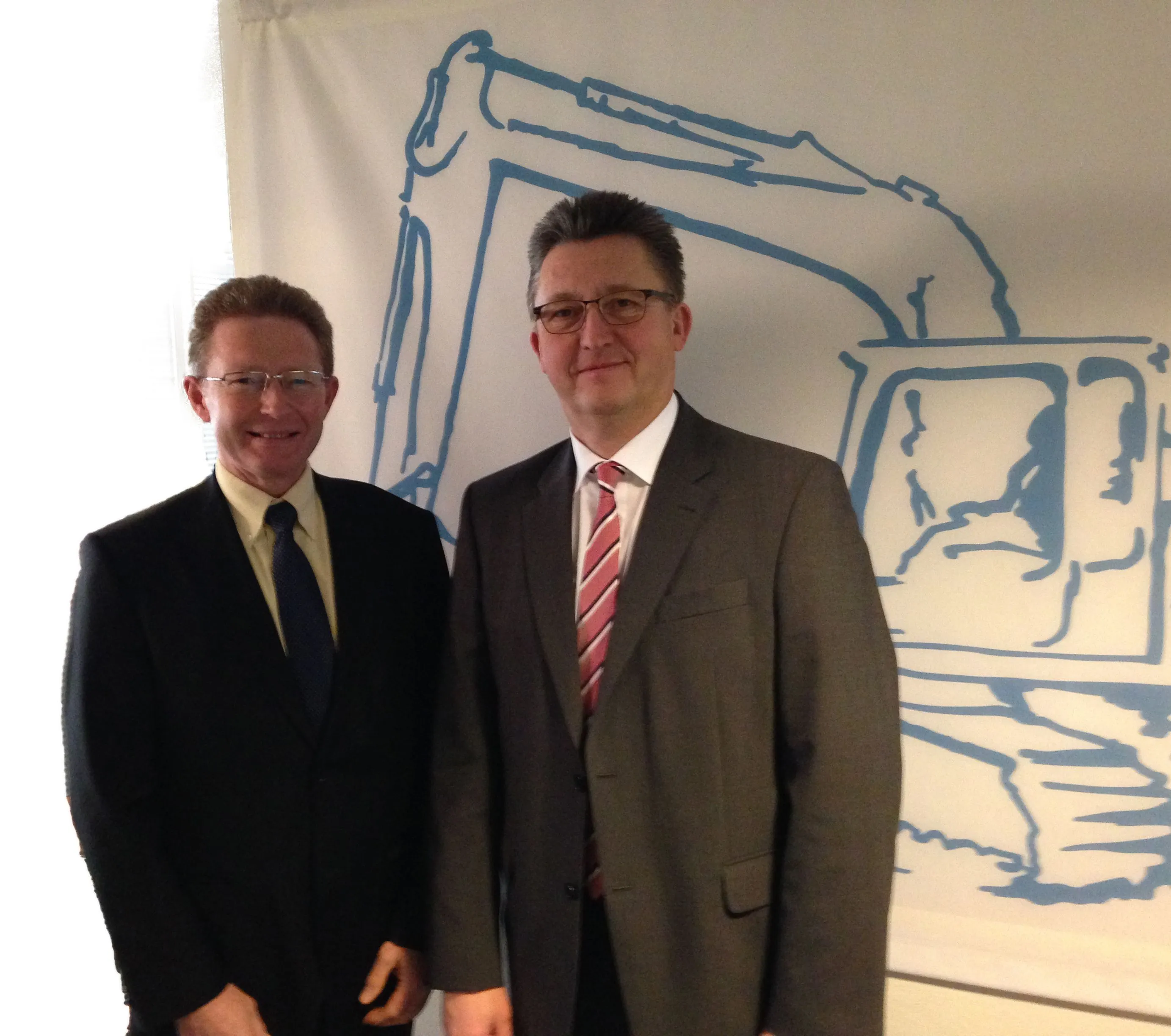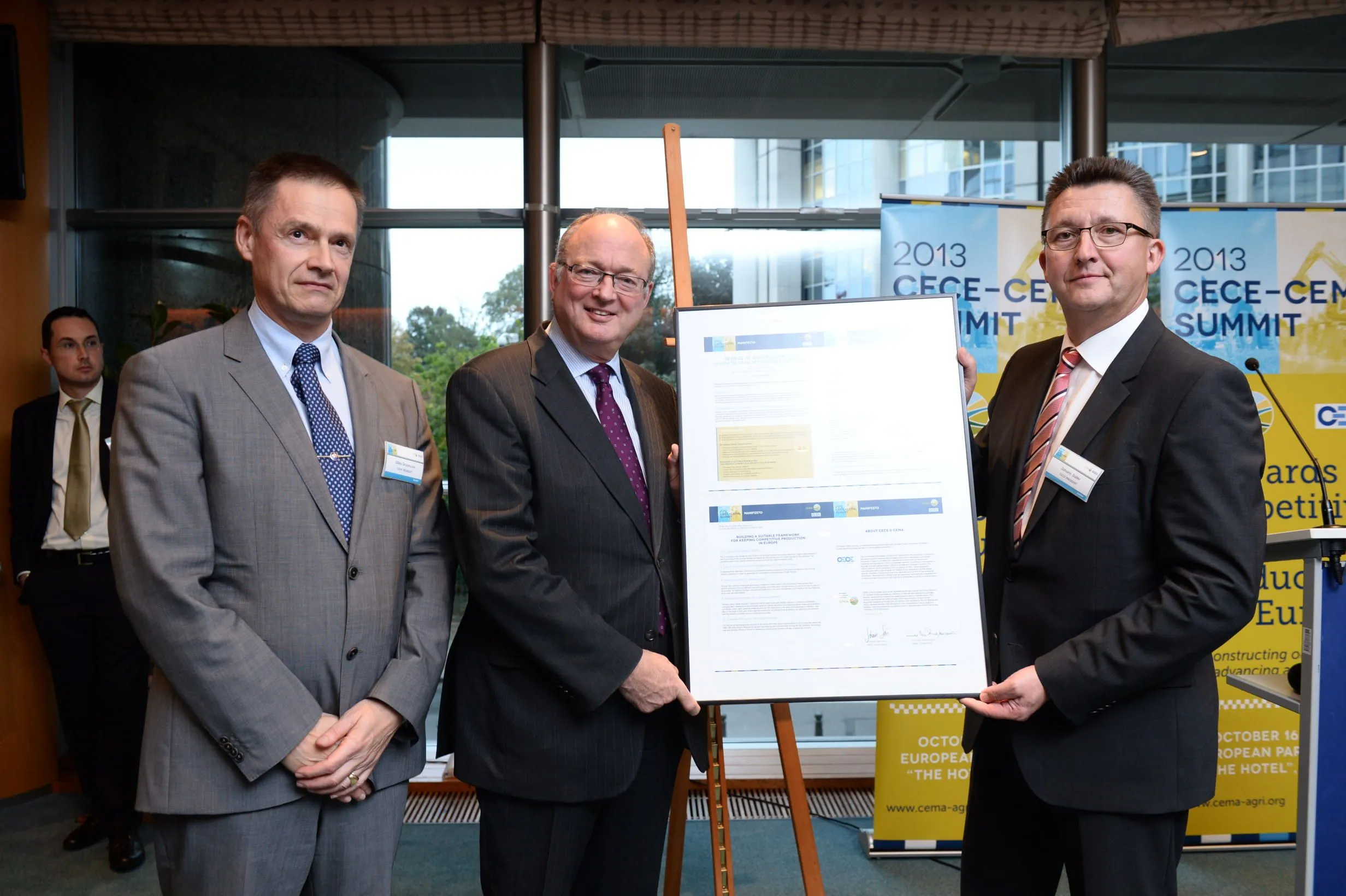At their joint summit, held in Brussels, Belgium, the presidents of CECE (Committee of European Construction Equipment) and CEMA (European Agricultural Machinery Association) presented to EU institutions a manifesto consisting of five priority actions for a successful digital transformation of the construction and the agricultural machinery industries.
September 25, 2015
Read time: 3 mins
At their joint summit, held in Brussels, Belgium, the presidents of 3399 CECE (Committee of European Construction Equipment) and CEMA (European Agricultural Machinery Association) presented to EU institutions a manifesto consisting of five priority actions for a successful digital transformation of the construction and the agricultural machinery industries.
EU legislation has a prominent role to play because digital technologies are set to transform the two industry’s products in the years ahead and will reshape the value chains they service.
“We need a smart regulatory framework that helps to unlock the full potential of the digital economy,” said CECE president Eric Lepine. A smart regulation would make sure that relevant EU regulation recognises the virtual testing of machines so it can replace, reduce and refine conventional tests in the future.
Also, the requirement that a human needs to be in control of a vehicle at all times may need to be reviewed.
Users and manufacturers need a reliable, secure and trustworthy cyberspace. To achieve this, the digital economy needs a harmonised European approach to achieve a high degree of interoperability and compatibility of digital technologies and systems. The EU should establish clear and appropriate rules governing questions such as the ownership, management and exploitation of digital data flows and the role and function of cloud-based platforms in the digital economy.
Also, EU programmes, such as the European Investment Plan, should support competitiveness and the uptake of innovation in construction. An adequate broadband infrastructure across the entire EU is an essential precondition for a successful digital transformation.
Digital transformation would increase demand for highly skilled workers. To this end, digital skills should be integrated more strongly into educational curricula and ongoing skill development programmes for manufacturing, engineering and construction. To tackle the estimated future shortage of information and communication technology professionals in Europe, member states should establish mutual recognition of ICT qualifications and promote cross-border mobility of workers with these skills.
During the summit, a group of young engineers showcased a number of highly innovative industry projects. This included an experimental pivoted drive unit for a road milling machine by Tobias Stinner in the development and engineering department of Wirtgen and a “green wheel loader” by Oliver Koch and Markus Schneider of Technical University of Dresden.
Their profiles and information on their projects are available on the Summit website %$Linker:2 External <?xml version="1.0" encoding="utf-16"?><dictionary /> 0 0 0 oLinkExternal here Visit cece-cema-summit website false http://www.cece-cema-summit.eu/ false false %>.
The CECE is an umbrella body based in Brussels that represents the interests of 1,200 companies in Europe. Last year, the industry had a total revenue of €25 billion and directly employed 130,000 people.
EU legislation has a prominent role to play because digital technologies are set to transform the two industry’s products in the years ahead and will reshape the value chains they service.
“We need a smart regulatory framework that helps to unlock the full potential of the digital economy,” said CECE president Eric Lepine. A smart regulation would make sure that relevant EU regulation recognises the virtual testing of machines so it can replace, reduce and refine conventional tests in the future.
Also, the requirement that a human needs to be in control of a vehicle at all times may need to be reviewed.
Users and manufacturers need a reliable, secure and trustworthy cyberspace. To achieve this, the digital economy needs a harmonised European approach to achieve a high degree of interoperability and compatibility of digital technologies and systems. The EU should establish clear and appropriate rules governing questions such as the ownership, management and exploitation of digital data flows and the role and function of cloud-based platforms in the digital economy.
Also, EU programmes, such as the European Investment Plan, should support competitiveness and the uptake of innovation in construction. An adequate broadband infrastructure across the entire EU is an essential precondition for a successful digital transformation.
Digital transformation would increase demand for highly skilled workers. To this end, digital skills should be integrated more strongly into educational curricula and ongoing skill development programmes for manufacturing, engineering and construction. To tackle the estimated future shortage of information and communication technology professionals in Europe, member states should establish mutual recognition of ICT qualifications and promote cross-border mobility of workers with these skills.
During the summit, a group of young engineers showcased a number of highly innovative industry projects. This included an experimental pivoted drive unit for a road milling machine by Tobias Stinner in the development and engineering department of Wirtgen and a “green wheel loader” by Oliver Koch and Markus Schneider of Technical University of Dresden.
Their profiles and information on their projects are available on the Summit website %$Linker:
The CECE is an umbrella body based in Brussels that represents the interests of 1,200 companies in Europe. Last year, the industry had a total revenue of €25 billion and directly employed 130,000 people.








